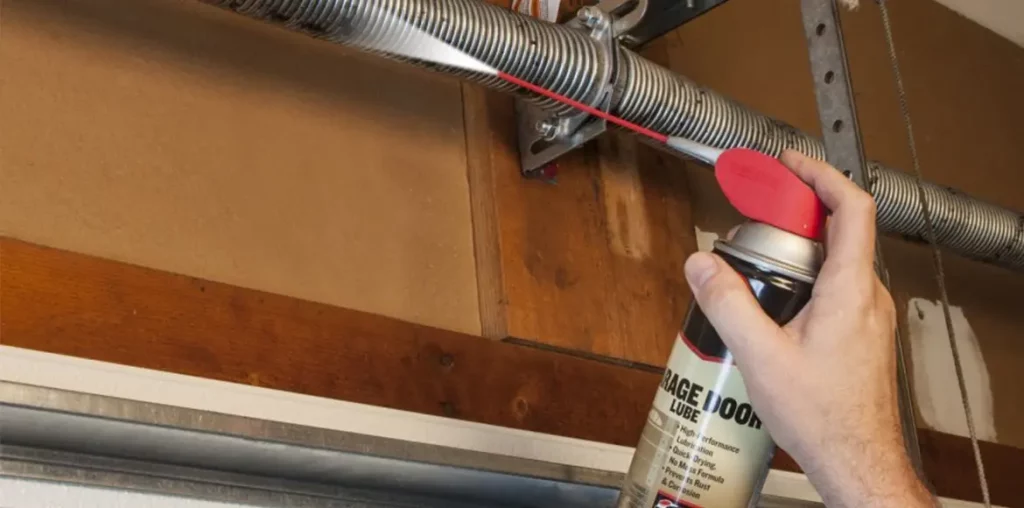Maintaining your garage door is essential to ensure its smooth operation and longevity. One question that often arises among homeowners is whether they should lubricate their garage door spring. In this comprehensive guide, we’ll delve into the factors to consider when deciding whether to lubricate your garage door spring, the benefits it can provide, and the proper techniques for doing so.

Understanding the Role of Garage Door Springs
Before we discuss whether you should lubricate your garage door spring, let’s first understand its role in the overall operation of your garage door. Garage door springs are responsible for counterbalancing the weight of the door, making it easier to open and close. There are two main types of garage door springs: torsion springs and extension springs.
Read too: No Power to Genie Garage Door Opener – Resolving the Issue with Ease: Troubleshooting Guide
Torsion springs are mounted above the garage door and use torque to lift and lower the door. Extension springs, on the other hand, are located on either side of the door and stretch and contract to facilitate its movement. Both types of springs are under significant tension and play a crucial role in the proper functioning of your garage door.
Should I Lubricate My Garage Door Spring: The Pros and Cons
Now that we understand the importance of garage door springs, let’s explore whether lubricating them is beneficial or not.
Pros of Lubricating Your Garage Door Spring:
- Reduced Friction: Lubricating your garage door spring can help reduce friction between the coils, allowing for smoother operation.
- Extended Lifespan: Proper lubrication can help prolong the lifespan of your garage door spring by preventing premature wear and tear.
- Quieter Operation: Lubrication can also help reduce noise associated with the operation of the garage door, resulting in a quieter and more pleasant experience.
Cons of Lubricating Your Garage Door Spring:
- Risk of Over-Lubrication: Over-lubricating your garage door spring can attract dirt and debris, leading to buildup and potential issues with the spring’s performance.
- Potential Mess: Lubricating the garage door spring can be a messy process, requiring careful application to avoid spills and drips.
- Safety Concerns: Lubricating garage door springs can be dangerous, as they are under high tension and can cause injury if mishandled.
How to Properly Lubricate Your Garage Door Spring
If you decide that lubricating your garage door spring is necessary, it’s essential to follow the proper techniques to ensure safe and effective application.
1. Gather Your Supplies:
- Silicone-based garage door lubricant
- Rag or cloth for wiping off excess lubricant
- Safety goggles and gloves for protection
2. Identify the Type of Spring:
- Determine whether you have torsion springs or extension springs, as each may require slightly different lubrication techniques.
3. Clean the Spring:
- Use a rag or cloth to wipe down the garage door spring and remove any dirt or debris that may have accumulated.
4. Apply Lubricant:
- Using a silicone-based garage door lubricant, apply a small amount to the coils of the spring. Be careful not to over-lubricate, as this can attract dirt and debris.
5. Wipe Off Excess Lubricant:
- After applying the lubricant, use a clean rag or cloth to wipe off any excess from the surface of the spring.
6. Test the Door:
- Once the lubricant has been applied, test the operation of your garage door to ensure that it moves smoothly and quietly.
Conclusion:
Deciding whether to lubricate your garage door spring is a personal choice that depends on various factors, including the type of spring you have, its condition, and your maintenance preferences. While lubricating the spring can offer benefits such as reduced friction and extended lifespan, it’s essential to weigh these against the potential risks, such as over-lubrication and safety concerns.
If you’re unsure about whether to lubricate your garage door spring or how to do so safely, consult a professional garage door technician for guidance. With proper care and maintenance, your garage door spring will continue to provide reliable performance for years to come.



Leave a Reply